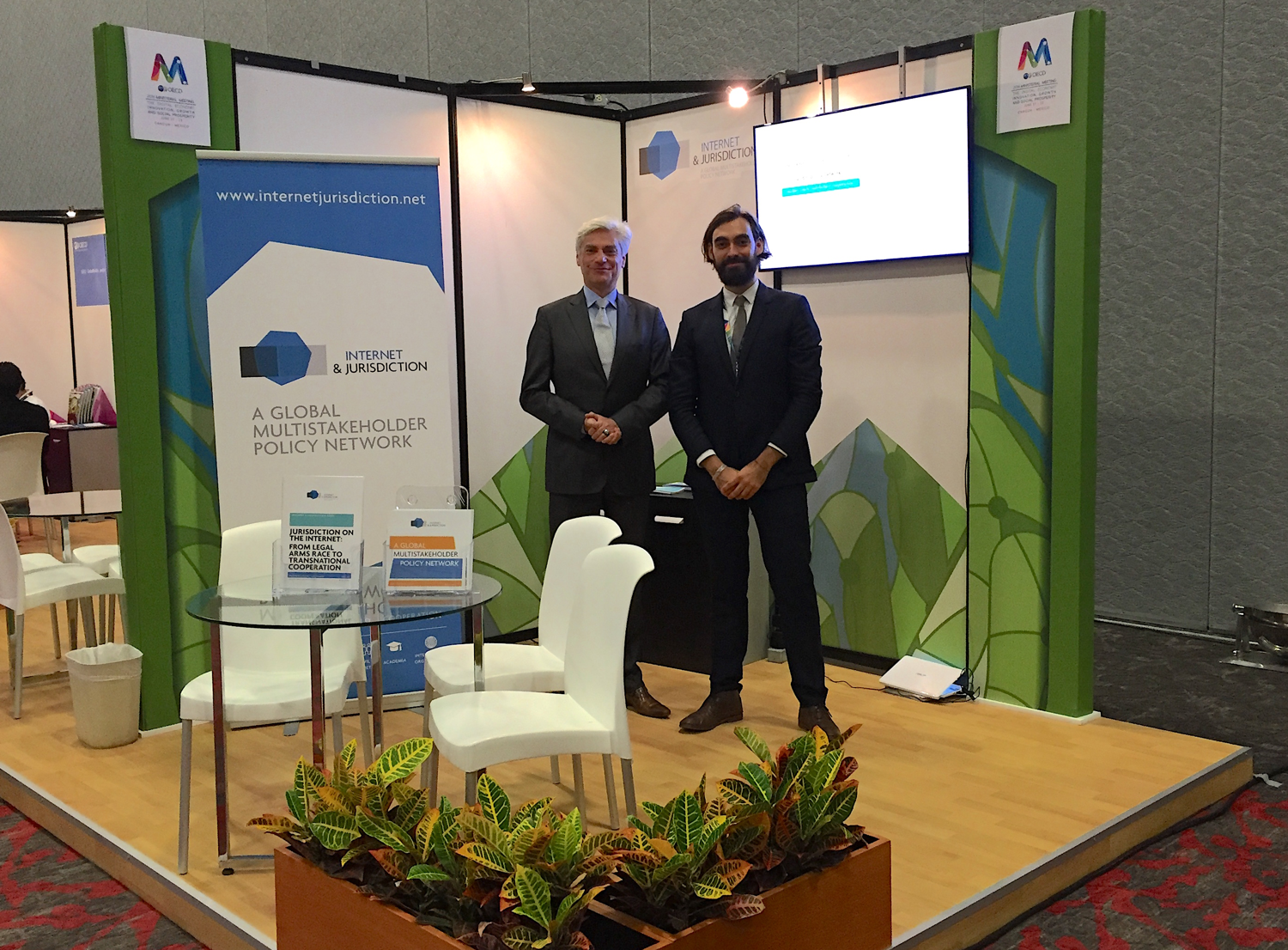21
Jun 2016
I&J Featured at OECD Ministerial Meeting
I&J contributed
June 23, 2016
Innovation, Growth, and Social Prosperity
The Organization for Economic Co-operation and Development (OECD) invited Internet & Jurisdiction to present the global multistakeholder policy network at the 2016 OECD Ministerial Meeting on the Digital Economy: Innovation, Growth and Social Prosperity. The work of Internet & Jurisdiction was featured on the expo floor of the Meeting, which took place in Cancún, Mexico from June 21-23, 2016.
The OECD Ministerial background report, Economic and Social Benefits of Internet Openness, cited the Internet & Jurisdiction multistakeholder process as being exemplary:
The [Principles for Internet Policy Making of the 2011 OECD Council Recommendation] endorse the development of voluntary codes of conduct through multi-stakeholder processes, such as the Internet & Jurisdiction Project.
This is the third time in the history of the OECD that ministers of its member states have gathered to discuss the future of the digital economy, following the 1998 Ministerial on Electronic Commerce in Ottawa and the 2008 Ministerial on the Future of the Internet Economy in Seoul.

Bertrand de La Chapelle and Paul Fehlinger manning the Internet & Jurisdiction booth.
Internet Openness and Innovation
Internet Openness and Innovation was one of the four key policy areas for the 2016 OECD Ministerial Meeting. This theme is deeply related to the work of the Internet & Jurisdiction policy network concerning legal interoperability, cross-border data flows, and the issue jurisdictional tension that impacts the future of the global digital economy. Two panels addressed the topic of openness, both held on June 22, 2016.
The first panel, The Economic and Social Benefits of Internet Openness, discussed what Internet openness is, why it is important, and what policy priorities are driving different approaches to Internet openness in different countries. Additionally, panelists addressed the decisions that policymakers face on technical, legal, governance, market, and social issues as they navigate their country’s participation in the digital economy.
Panelists
Navdeep Bains
Minister of Innovation, Science, and Economic DevelopmentCanada
Kaspars Gerhards
Minister for Environmental Protection and Regional DevelopmentRepublic of Latvia
Alejandra Lagunes
Chief of the National Digital StrategyOffice of the President of Mexico
Lawrence Strickling
Assistant Secretary for Communications and InformationUnited States Department of Commerce
Roberto Viola
General Director, DG CONNECTEuropean Commission
Caroline Atkinson
Head of Global PolicyMishi Choudhary
Legal DirectorSoftware Freedom Law Center
The second panel, Stimulating Digital Innovation across the Economy, explored policies and practices to address social and economic goals related to stimulating digital innovation. In addition, panelists were invited to discuss how policies supporting digital innovation may be used to further other policy objectives, such as regional development and addressing poverty.
Panelists
Idlefonso Guajardo Villareal
Secretary of the EconomyMexico
Choi Yanghee
Minister of Science, ICT, and Future PlanningSouth Korea
Paul Chaffey
State Secretary for the Ministry of Local Government and ModernisationNorway
Hiroshi Eskai
Professor, Graduate School of Information Science and TechnologyUniversity of Tokyo
Eun-ju Kim
Chief of Innovation and Partnership DepartmentTelecommunication Development Bureau, ITU
About the OECD
The Organisation for Economic Co-operation and Development (OECD) is an international economic organisation of 34 member countries with the mission to promote policies that will improve the economic and social well-being of people around the world. Founded in 1961, the OECD uses its wealth of information on a broad range of topics to help governments foster prosperity and fight poverty through economic growth and financial stability.
The 2016 “Innovation, Growth, and Social Prosperity” meeting in Cancún is the third OECD Ministerial Meeting on the Digital Economy, following Ottawa in 1998 and Seoul in 2008. The 2016 Ministerial is a significant milestone, taking place at a time of unprecedented mobility, connectivity, and interdependence when few aspects of modern life remain untouched by the transformations of the digital economy.
Innovation, Growth, and Social Prosperity
The Organization for Economic Co-operation and Development (OECD) invited Internet & Jurisdiction to present the global multistakeholder policy network at the 2016 OECD Ministerial Meeting on the Digital Economy: Innovation, Growth and Social Prosperity. The work of Internet & Jurisdiction was featured on the expo floor of the Meeting, which took place in Cancún, Mexico from June 21-23, 2016.
The OECD Ministerial background report, Economic and Social Benefits of Internet Openness, cited the Internet & Jurisdiction multistakeholder process as being exemplary:
The [Principles for Internet Policy Making of the 2011 OECD Council Recommendation] endorse the development of voluntary codes of conduct through multi-stakeholder processes, such as the Internet & Jurisdiction Project.
This is the third time in the history of the OECD that ministers of its member states have gathered to discuss the future of the digital economy, following the 1998 Ministerial on Electronic Commerce in Ottawa and the 2008 Ministerial on the Future of the Internet Economy in Seoul.

Bertrand de La Chapelle and Paul Fehlinger manning the Internet & Jurisdiction booth.
Internet Openness and Innovation
Internet Openness and Innovation was one of the four key policy areas for the 2016 OECD Ministerial Meeting. This theme is deeply related to the work of the Internet & Jurisdiction policy network concerning legal interoperability, cross-border data flows, and the issue jurisdictional tension that impacts the future of the global digital economy. Two panels addressed the topic of openness, both held on June 22, 2016.
The first panel, The Economic and Social Benefits of Internet Openness, discussed what Internet openness is, why it is important, and what policy priorities are driving different approaches to Internet openness in different countries. Additionally, panelists addressed the decisions that policymakers face on technical, legal, governance, market, and social issues as they navigate their country’s participation in the digital economy.
Panelists
Navdeep Bains
Minister of Innovation, Science, and Economic DevelopmentCanada
Kaspars Gerhards
Minister for Environmental Protection and Regional DevelopmentRepublic of Latvia
Alejandra Lagunes
Chief of the National Digital StrategyOffice of the President of Mexico
Lawrence Strickling
Assistant Secretary for Communications and InformationUnited States Department of Commerce
Roberto Viola
General Director, DG CONNECTEuropean Commission
Caroline Atkinson
Head of Global PolicyMishi Choudhary
Legal DirectorSoftware Freedom Law Center
The second panel, Stimulating Digital Innovation across the Economy, explored policies and practices to address social and economic goals related to stimulating digital innovation. In addition, panelists were invited to discuss how policies supporting digital innovation may be used to further other policy objectives, such as regional development and addressing poverty.
Panelists
Idlefonso Guajardo Villareal
Secretary of the EconomyMexico
Choi Yanghee
Minister of Science, ICT, and Future PlanningSouth Korea
Paul Chaffey
State Secretary for the Ministry of Local Government and ModernisationNorway
Hiroshi Eskai
Professor, Graduate School of Information Science and TechnologyUniversity of Tokyo
Eun-ju Kim
Chief of Innovation and Partnership DepartmentTelecommunication Development Bureau, ITU
About the OECD
The Organisation for Economic Co-operation and Development (OECD) is an international economic organisation of 34 member countries with the mission to promote policies that will improve the economic and social well-being of people around the world. Founded in 1961, the OECD uses its wealth of information on a broad range of topics to help governments foster prosperity and fight poverty through economic growth and financial stability.
The 2016 “Innovation, Growth, and Social Prosperity” meeting in Cancún is the third OECD Ministerial Meeting on the Digital Economy, following Ottawa in 1998 and Seoul in 2008. The 2016 Ministerial is a significant milestone, taking place at a time of unprecedented mobility, connectivity, and interdependence when few aspects of modern life remain untouched by the transformations of the digital economy.



